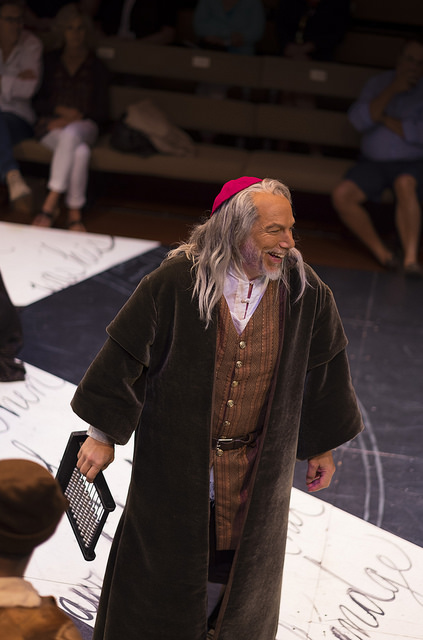The Merchant of Venice
Shakespeare & Company
Lenox, Mass.
July 1 – August 21, 2016
Review by Seth Rogovoy
(LENOX, Mass., July 31, 2016) – This summer’s production of “The Merchant of Venice,” directed by Tina Packer and starring Jonathan Epstein as Shylock, is Shakespeare & Company at its best, combining a skillful presentation of the text with an improvisatory spirit that is true to the history of Shakespearean theater while signaling the timeless and contemporary nature of the work.
“Merchant” has always been a “problem play,” hard to classify (a comedy in structure, but with tragic elements and based in historical truth, if not a “history” play), difficult to discern (partly owing, perhaps, to missing scenes in the text that has been passed down, or perhaps because of some sloppiness on the part of the playwright), and widely open to interpretation (almost impossible to determine where, if anywhere, sympathy lies).
Packer and company do a heroic job in wrestling with these problems and staging a fully coherent, at times provocative, and entertaining three hours of theater that goes by seemingly much quicker than that and never lags – partly thanks to the playwright, who kept the individual scenes and speeches relatively short and snappy.
This well cast, mostly race- and gender-blind production is dazzling in its staging in the round (and even more so, at times making use of the theater’s upper level and even seats in the audience) and the scope of its colors and emotion, from the darkest of blacks and grays to the bright and colorful (and somewhat ominous and threatening) scenes of masquerades and celebrations. The jokes, improvisations and anachronistic ad libs – all of which were commonplace in original performances of Shakespeare – come quick and often, keeping the actors and audience on the edge – a good place to be.
As for the matter of Shylock’s portrayal and the issue of Jew-hatred, the tenor of the production and the dignity and bearing that Jonathan Epstein invests in his Shylock is remarkably sympathetic, especially in the context of a play in which nearly every character is a deceitful, bigoted liar and a thief.
If only measured by the despicable behavior of those swirling around him – violent, misogynist, racist, conniving thugs, men and women alike – Epstein’s Shylock stands out for his measured calm and his transparency. He doesn’t hide his hatred for his tormentors nor his lust for vengeance, and he doesn’t need to. He at least lives by a code, which includes obedience unto the law of the state and the law of his God, unlike nearly everyone else in Venice and Belmont, whose codes ultimately come down to “the ends justify the means,” even if this is at the cost of betrayal of law, God, and love. His love for his daughter Jessica (played by Kate Abbruzzese) is pure, and Jessica, also, is seen as a victim of a betrayal, rather than as the villainous, treacherous daughter she is often made out to be.
There are a few weak links in the cast, but special note should be made of Jason Asprey’s phenomenal performance as Graziano, Erick Avari’s deft hat trick of a performance as the Duke of Venice, the Prince of Morocco, and the Prince of Aragon, Tamara Hickey’s highly strung Portia, and the beautifully played odd couple of Shahar Isaac as Bassanio and John Hadden as Antonio.
This “Merchant” is not an anti-Semitic play by any means. It is a play about human venality and cruelty that manifests in numerous aspects, including violence, anti-Semitism, racism, misogyny, state corruption, prejudice, bigotry, and betrayal. That somehow it represents all this while being entertaining – even comic much of the time – is a tribute to the playwright and especially to the visionary minds behind this exciting production.


